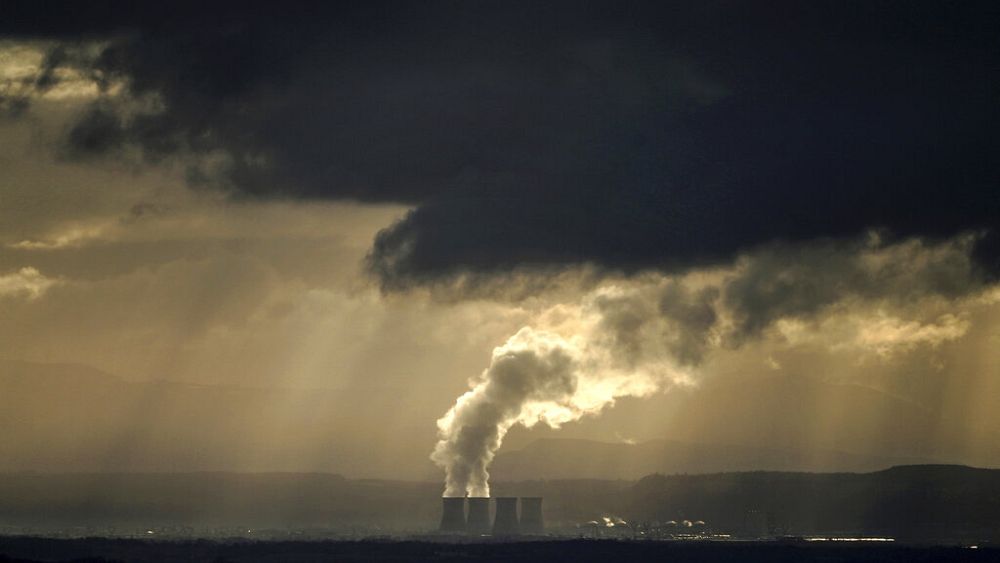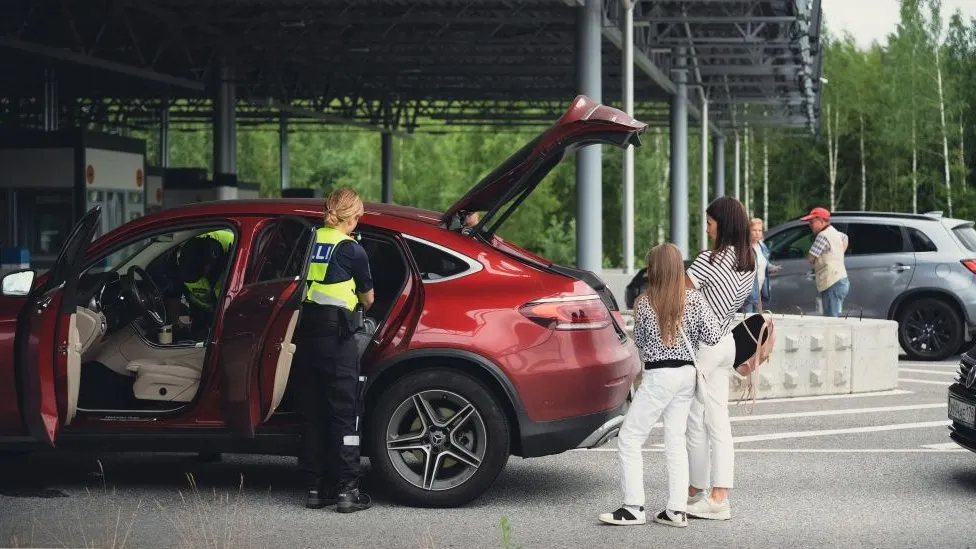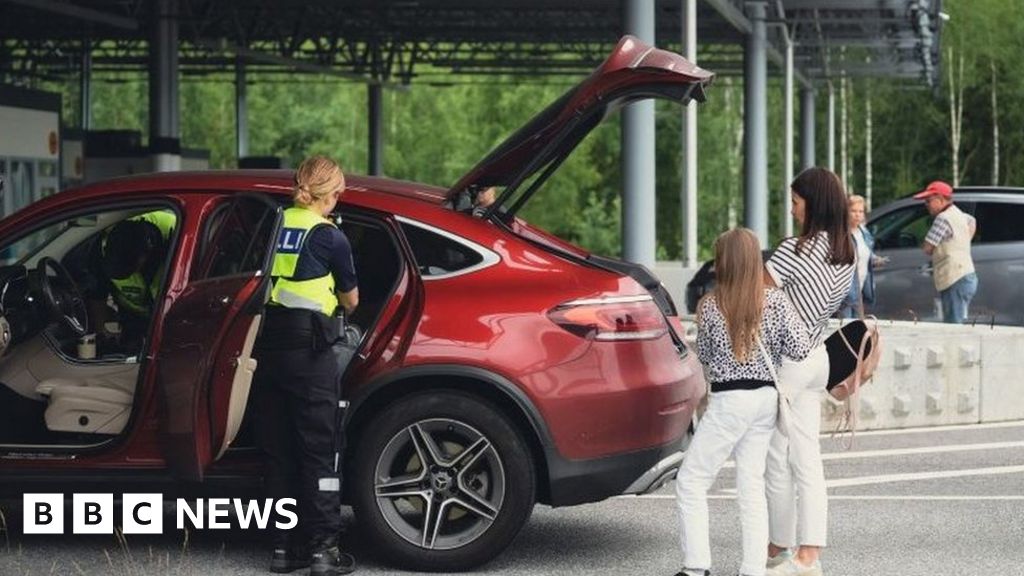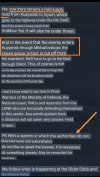AMC
Ylipäällikkö
Nopea poistuminen örkkien kesäkeittiöstä. Kaalisopatkin jäänyt syömättä.
Follow along with the video below to see how to install our site as a web app on your home screen.
Note: This feature may not be available in some browsers.
The UN secretary general, António Guterres, has called for a demilitarised zone around the Zaporizhzhia nuclear plant, involving the withdrawal of Russian occupying troops and the agreement of Ukrainian forces not to move in.
Guterres was addressing a UN security council session on Tuesday, at which he supported the recommendations put forward Rafael Mariano Grossi, the director general of the International Atomic Energy Agency (IAEA) who led an inspection visit to the occupied Zaporizhzhia plant last week, and presented a report to the security council. The report confirmed the presence of Russian soldiers and military equipment at the plant, including army vehicles.
“We are playing with fire and something very, very catastrophic could take place. This is why in our report, we are proposing the establishment of a nuclear safety and security protection zone limited to the perimeter and the plant itself,” Grossi said.
Guterres said that, as a first step, Russian and Ukrainian forces should cease all military operations around the plant.
“As a second step, an agreement on a demilitarised perimeter should be secured,” he added. “Specifically, that will include the commitment by Russian forces to withdraw military personnel and equipment from that perimeter and the commitment by Ukrainian forces not to move in.”
Ukraine’s president, Volodymyr Zelenskiy, offered qualified support for Grossi’s proposal to create a demilitarised zone around the plant and asked for more detail on the plan.
“If the content of this proposal is to demilitarise the territory of the nuclear power plant – and this is logical, as it was the Russian military presence that put the Zaporizhzhia plant on the brink of a radiation disaster - then we can support such a demilitarised protection zone,” he said.

The IAEA said that, during its inspection, its team “closely witnessed shelling in the vicinity of the power plant, in particular on 3 September when the team was instructed to evacuate to the ground level of the administrative building”.
On the same day, the plant was disconnected from its last remaining main power line to the grid and was relying on a reserve line.
“While the ongoing shelling has not yet triggered a nuclear emergency, it continues to represent a constant threat to nuclear safety and security with potential impact on critical safety functions that may lead to radiological consequences with great safety significance,” the inspectors wrote.
Areas damaged by shelling included a turbine lubrication oil tank and the roofs of various buildings such as one housing a spent fuel transporter vehicle.
Grossi is expected to brief the UN security council in New York on his findings later on Tuesday.
Earlier, blasts rang out and power was cut in Enerhodar, the city surrounding the plant, according to Dmytro Orlov, the Ukrainian mayor who operates from outside Russian-held territory. Moscow repeated its longstanding accusations that Ukrainian forces had been shelling the plant.
Kyiv says it is Russia that has been staging such incidents, to undermine international support for Ukraine and as a possible pretext to cut the plant from the Ukrainian power grid and steal its output.
guardian live updateIn his first television interview since leading an expert mission to the Russian-held Zaporizhzhia nuclear power plant, International Atomic Energy Agency Director General Rafael Grossi tells CNN’s Christiane Amanpour we are facing “a very grave danger” as shelling continues at the plant.
“The situation continues to be very worrying,” Grossi said. “The shelling continues, so we are still facing a very grave danger. The mere fact there is continuity of attacks and shelling, deliberate or not, wittingly or unwittingly, people are hitting a nuclear power plant, the largest in Europe. So I must say that the danger continues.”
He continued, underlining the huge dangers posed currently: “I demand nuclear safety is indispensable. Nuclear security is indispensable. We are playing with fire.”
When asked about the IAEA establishing a demilitarized zone around the nuclear plant, Grossi said there must be a differentiation between a demilitarized zone versus creating a “nuclear safety and security zone.”
“What we are talking about here is the establishment of a nuclear safety and security protection zone immediately, which is perhaps more modest than a full demilitarization of the area, but extremely effective in getting commitment from all sides to avoid any aiming at the plant, any shelling at the plant, any use of any means and calibers of artillery in a direction of the plant.”
Grossi continued: “What is urgently needed now – today – is that we agree on establishing a protection, a shield, a bubble around the perimeter of the facility. This is not something which is impossible to do – not at all. The IAEA has the mandate to protect the safety and security of the plant and the people there. I hope to consult very quickly and establish this as an interim measure in the hope that there will be further things.”
When asked whether the remaining IAEA inspectors would stay at the nuclear plant as part of a permanent mission, Grossi confirmed the IAEA would remain on site.
“And if somebody wants us to leave, then let that someone explain why is the IAEA forced to leave.”
Näyttää kyllä ihan liian siistiltä ryssän kesäkeittiöksi.Nopea poistuminen örkkien kesäkeittiöstä. Kaalisopatkin jäänyt syömättä.

Samaa pohdinNäyttää kyllä ihan liian siistiltä ryssän kesäkeittiöksi.
 Ehkä oli ylemmän esikunnan keittiö ja siellä on ollut siivoushommissa ne joiden piti pitää vahtia
Ehkä oli ylemmän esikunnan keittiö ja siellä on ollut siivoushommissa ne joiden piti pitää vahtia 
A brief exchange between Liudmyla Mashkova and her pupils, in which she asks them in German to open a window because the classroom is stuffy, illustrates how far they have come. “Ja klar,” Artur Ivanov responds in the same language, and there’s a collective sigh of relief as everyone enjoys the fresh breeze.
The secondary school teacher, from Kyiv, has been leading a class of Ukrainian students, aged 12 to 17, since April. They are in Potsdam, a German city just west of Berlin, where the Helmholtz Gymnasium, or secondary school, has given them space and resources.
Mashkova has been employed to teach German in one of the thousands of willkommensklassen, or welcome classes, set up at schools across the country.
She fled the war in Ukraine at the beginning of March along with her 16-year-old son and five-year-old daughter, leaving behind her husband, an officer in the Ukrainian army.

Hers are among more than 150,000 school-age children who have arrived in Germany since the start of the Russian invasion and are being integrated into the school system. Mashkova is one of many Ukrainian teachers who are vital to the effort, not least because of a shortage of about 30,000 German teaching staff.
Opinions differ as to the best way to educate them. German authorities are modelling the accommodation of young Ukrainians on the experience from 2015, when almost 1 million refugees arrived from Syria.
Back then the willkommesklassen were introduced with the goal of teaching the new arrivals German and preparing them for eventual transfer into regular classes.
The Ukrainian consul general, Iryna Tybinka, however, has been insistent that Ukrainian children should be able to continue with their native school curricula, due to what she has called the temporary nature of their stay.
Mashkova recognises the strong motivation among her pupils and their parents, with whom she is in close contact, to return home as soon as possible. But there is also realism a keenness to learn German, in part due to the recognition that they might be there for the next two years at least.
Ranskassa 32 ydinreaktoria on nyt pois pelistä. Ranska ilmoittaa tavoitteeksi käynnistää 27 reaktoria 12/2022 mennessä, loput 5 kpl alkuvuodesta.

Tappio on siis myönnetty. Mikä mahtaa olla desantin exit plan? Atamaaniksi Luhanskiin ei olekaan kutsua tulossa. Ja hyödyttömät idiootit on tapana poistaa kertomasta mitä oikeasti tapahtui.Äh, deZantti on muuttanut Twitter-tilinsä vain uskollisille putinisteille näkyväksi.
Harmi, olisin kysellyt kuulumisia.
Telnyashka-kuvioinen tiskirätti voisi olla Lekan seuraava Jämä-hittituote.Ruutupaitayrjönauhaörkkejä ei ilmeisesti taistelut napostele.


The European Union is proposing to make it more expensive and harder for Russian citizens to get visas.
Russians wanting to enter the EU will face a lengthier application process and see fees rise from €35 (£30; $34) to €80 (£69; $79).
This should continue as long as Moscow wages its war of aggression against Ukraine, the EU Commission said.
More than a million Russians have travelled to EU countries since the invasion of Ukraine in February.
Margaritis Schinas, an EU Commission vice-president, said Russia had "completely undermined" the trust on which the existing EU-Russia visa agreement was based.
Under that agreement, Russians had for 15 years enjoyed a streamlined process for getting EU visas.
EU Commission President Ursula von der Leyen, tweeted to say that the visa agreement should be suspended as there "can be no business as usual" with Russia.

Jos Balakliya kaatuu, niin saisivatkohan ukrainalaiset Iziumin "ilmaiseksi" jos saavat luotua riittävästi painetta motin muodostamiskesi tai riittävän uhkan siitä, mikä ajaisi puolustajat vetäytymään?
Katso liite: 66808
Jokohan tuo Borovan silta on rikottu?

